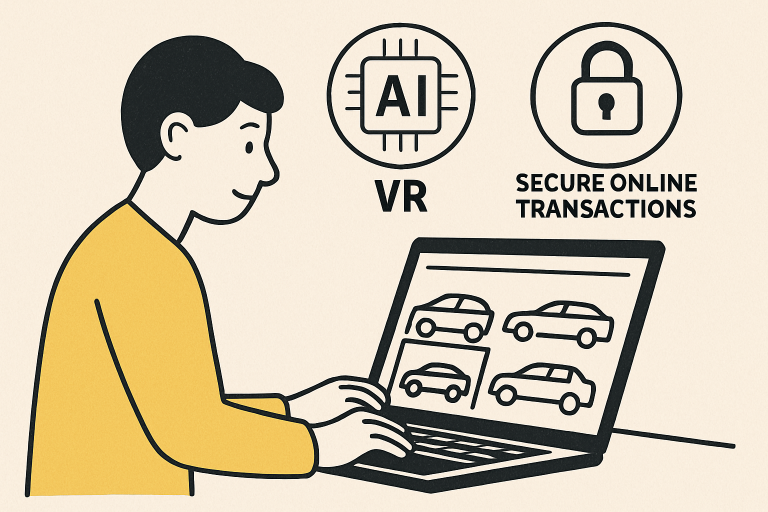How Technology Is Changing Car Buying
Technology is dramatically transforming how people buy cars, making the process much more efficient, transparent, and personalized than ever before. Gone are the days when purchasing a vehicle meant spending entire afternoons at crowded dealerships, negotiating deals, and sorting through mountains of paperwork. Instead, innovations such as virtual showrooms, artificial intelligence, and blockchain allow consumers to explore their options with unprecedented convenience and confidence.
To experience how dealerships adapt to new technologies, learn more about the latest models designed with cutting-edge features and digital-first car shopping in mind. Major shifts occur across every step of the car-buying journey, from interactive online research to the final purchase agreements handled without ever stepping outside. Digital advancements also respond to a new generation of buyers who expect seamless, transparent, and highly customized shopping experiences. Whether considering your first car or upgrading to a luxury model, today’s technology provides greater control over every part of the process, empowering you to make informed decisions and find a vehicle that fits your unique needs.
Virtual Showrooms and Augmented Reality
Virtual reality (VR) and augmented reality (AR) have revolutionized the initial stages of car shopping. With VR, customers can experience interactive model walkarounds, examine the finest interior details, and even take virtual test drives—all from their homes. Major brands are investing heavily in these immersive technologies. For instance, Fiat’s metaverse-powered showrooms let buyers explore cars in a life-like digital environment, customizing features and colors in real time.
These innovations are novelties and powerful tools that empower the buyer and reduce the pressure associated with traditional showrooms. Beyond convenience, AR technology integrated into mobile devices allows users to visualize how a car might look in their driveway or garage. This level of engagement creates a much deeper connection before even setting foot on a lot. Adopting virtual car showrooms during COVID-19 has shifted consumer expectations and accelerated digital adoption across the industry.
AI-Driven Personalization and Financing
Artificial intelligence is one of the most robust drivers of change in automotive retail. By harnessing user data, AI-powered recommendations present buyers with vehicles that closely match their preferences, lifestyles, and anticipated needs. This same intelligence can assist in forecasting maintenance schedules or suggesting upgrades, all tailored uniquely to the buyer. Financing, a traditionally stressful step, is now greatly simplified by AI.
Platforms can scour dozens of lenders, instantly generate personalized finance packages, and even grant near-instant approvals—all while reducing admin burdens for both buyer and dealer. Chatbots and virtual assistants further enhance the experience by answering questions 24/7, guiding users through complex options, and ensuring that no crucial details are overlooked. These tools make shopping for a car as intuitive and guided as shopping for any other product online, creating a hassle-free pathway from research to vehicle delivery.

Online Car Marketplaces
The explosion of digital marketplaces has dramatically expanded consumer choice. Platforms are making it possible to buy and even finance a car entirely online. Shoppers can filter vast inventories, analyze fair market pricing, view vehicle histories, and arrange for home delivery—no dealership visit required. This shift is more than convenience; it has redefined trust and transparency in the process.
As buyers grow accustomed to these online environments, industry experts predict continued growth in e-commerce vehicle sales. Online reviews and user-generated ratings give shoppers additional assurance, with marketplaces building robust systems for resolution and support. The marketplace model puts power into the hands of the consumer, minimizing negotiation stress and providing insights that lead to better-value deals.
Blockchain for Vehicle History
Trust has always been a significant concern in the used car market. Blockchain technology addresses this challenge by offering reliable, unalterable records that track a vehicle’s life story. From ownership and accidents to scheduled maintenance and recalls, every event can be logged into a distributed ledger, making it virtually impossible to counterfeit.
This ensures buyers have access to a verified history, significantly reducing the risks traditionally associated with pre-owned cars. For dealers, blockchain streamlines back-office operations. It delivers peace of mind for consumers, knowing that the purchase is based on verifiable data, not sales pitches or incomplete histories. Third-party verification systems are increasingly partnering with reputable brands to provide secure, tamper-proof documentation for every sale.
Car Subscription Services
Subscription services are changing the math of ownership in favor of flexibility. Instead of long-term commitments or financial risks, drivers pay a monthly fee that usually includes maintenance, insurance, roadside assistance, and the ability to swap between different models. This model provides unmatched convenience and adaptability for urban dwellers or those who value variety. As more people demand access over ownership, car subscriptions will likely grow in market share, challenging traditional sales and lease arrangements. Automakers and third-party providers are experimenting with packages that cater to commuters, families, or adventure seekers, making it easier than ever to match a vehicle to changing life circumstances.
In conclusion, technology is reshaping every step of the car-buying process—empowering buyers with information, enhancing personalization, and ushering in new models for access. As these innovations continue to develop, consumers can expect car shopping to become even more seamless, interactive, and aligned with digital age standards.
Visit the rest of the site for more interesting and useful articles.

